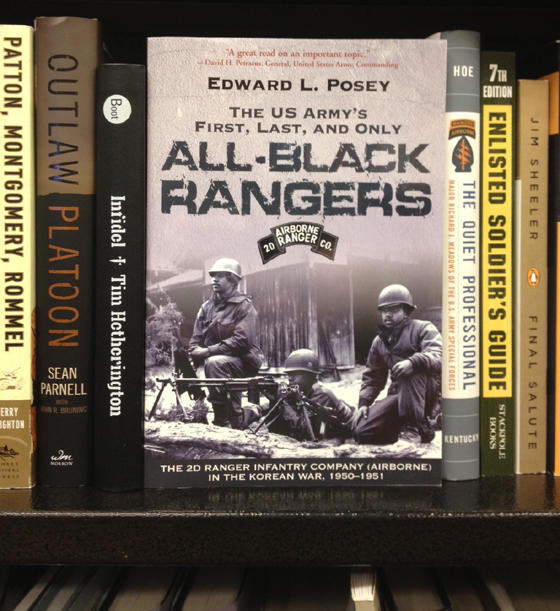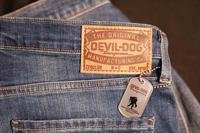Armies are temples of ancestor worship. Basil Liddell Hart 1944
Took this at the bookstore when I bought the book. (Note: Outlaw Platoon is superb; I'll be writing a review of it soon.)
Ed. note: We’ve revisiting classic military books and movies here at UTR.. If any of our readers have favorites they want to share, let us know.
If Korea is, as they say, the 'forgotten war', how much more forgotten is a small all-black unit that fought therein?
Before I met Col. McGee I'd heard about many of the all-black and all-Japanese units from the days of military segregation, but a cursory knowledge of the Tuskegee Airmen and Redtails (largely from the movies) and some of the support units (like the Airfield Security Battalions) was about the extent of it. I certainly hadn't realized there were still completely segregated units in Korea (Executive Order 9981 was in 1948 after all), though I probably should have.
For instance, I had no idea there was an all-black Ranger company in Korea. Edward L. Posey's All Black Rangers: The 2D Infantry Company (Airborne) in the Korean War 1950-51 details the history of that unit. The author was one of the Buffaloes of the 2D Ranger Infantry Company (Airborne). He is a retired Army Master Sergeant. He enlisted in 1947, served with Lima Company, 3D Battalion, 505TH Airborne Infantry Regiment. He went to jump school with the Rangers in 1950, got his mustard stain in Korea, retired in 1969 and was inducted to the Ranger Hall of Fame in 2002. He is now 79 years old.
The book itself has been well received by military sholars and was a finalist in the 2009 Army Historical Foundation Distinguished Writing Awards. It traces 2ND Company through training, with anecdotal recollections of recruitment, through its first action at Tanyang Pass to the Munsan-Ni para drop on 23 March 51, assaulting Hill 151, where Lt. Richard E Robinson became the first black paratrooper to make a combat jump and then to the Strategic Reserve stationed in the occupation of Japan. As one might expect, the paratroopers in training faced not only the traditional obstacles of troops in training and combat, but the resistance and bigotry of the Army in which they served. Thankfully there are a few things to counterbalance this sort of willful stupidity: for example, the aforementioned Lt. Robinson.
 "...Lt. Richard E. Robinson, the only black officer in the 187TH Airborne RCT, was there because the white officer paratroopers of his OCS...said they would not go without him...because the rest refused to go with him, when the 187TH RCT jumped at Suk'ch'on, Korea, Robinson became the first black paratrooper in the United States Army to make a combat jump..."
"...Lt. Richard E. Robinson, the only black officer in the 187TH Airborne RCT, was there because the white officer paratroopers of his OCS...said they would not go without him...because the rest refused to go with him, when the 187TH RCT jumped at Suk'ch'on, Korea, Robinson became the first black paratrooper in the United States Army to make a combat jump..."
As a unit, 2D Company took a beating, but its performance made it clear what a remarkable group of men it was. 64 of the 140 Rangers who served in 2D Company between 1950-1 retired after 20 years of service. 15 of them became officers and some went on to other branches (including the SEALs when they were formed). 6 million Americans served in Korea; 8% of them were black. 5,000 of them were Killed In Action and 13 of those were with 2D Co.
4 members of 2D Ranger Infantry Company (Airborne) 187TH Regimental Combat Team were subsequently inducted into the US Army Ranger Hall of Fame, and the unit was awarded the Combat Infantry Streamer. This honor is a commendation for units that suffer more than 65% casualties to enemy action in one single engagement.
For me, I'm a military history-phile. I enjoy reading anything like this, particularly if it's a humble and non-hyperbolic account of guys who achieved extraordinary things under horrible conditions. It's also interesting to read about and then research terms that are now anachronistic, like "A&P" (Ammunition and Pioneer) Platoons, and the Korean War era military phonetic alphabet. (D is for Dog, not Delta! It ain't Echo, it's Easy!) Coming from a time when you can get on the internet and read about every sort of unit that's out there (including today's Ranger battalions) I liked hearing them recount how they were recruited, or what they thought they were getting into.
"We are forming the toughest, meanest outfit in the US Army. I don't know if you will go in by submarine, parachute or what, but you will be fighting! The unit will be called Rangers. We want volunteers. The line forms to the right."
BLUF: It's an excellent book and one I think is worth adding to your collection, particularly if you're a military history buff. Note that the writing is not as visceral as some you will read, for a number of reasons. After all, it's about a fight from over a half a century ago, in many cases based on the memories of men now in their seventies and eighties. That sort of remove is always going to make descriptions less immediate than something the reader has seen on the screen. That's why movies and shows like Band of Brothers, Red Tails, Chosin and more recently Act of Valor evoke the response they so often do. Too, books about contemporary warfare echo things the readers have seen on the news, in first-hand documentaries frequently shot with unprecedented technology and access, and in many case where they've deployed themselves.
This by no means detracts from the book, nor does it hold true throughout. There are anecdotal recollections. Just be aware that overall it is more like an scholar's monograph than the individual own first-person story such as you might read in Parnell's Outlaw Platoon, Gallagher's Kaboom, Chris Kyle's American Sniper or even the sort of embedded first hand account you'd read in Junger's War.
Pick up a copy of the book Read about Changnim-ri and Operation Tomahawk. These guys were tough, dedicated soldiers who deserve to be remembered. Besides, what's not to like about guys who jump from C-46s at 600' using T-7s? In the air for less than 30 seconds, 'bit of a bump' then straight into automatic weapons fire.
One must wonder if it was hard to jump with all that equipment and balls that big.
The book's official website is here.
Col. Charles McGee and me. I was privileged to meet the good Colonel recently; 3 wars, 409 aerial combat missions, still a compelling speaker and an impressive man.






